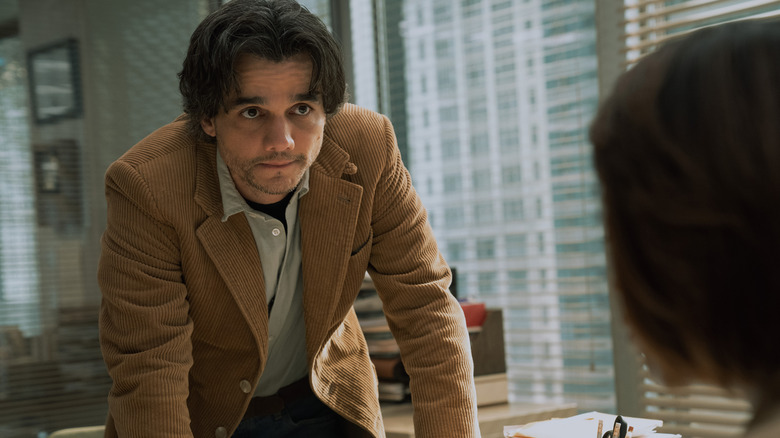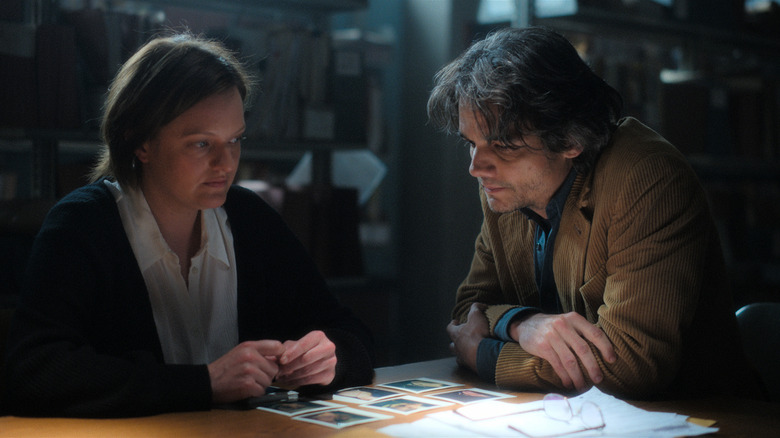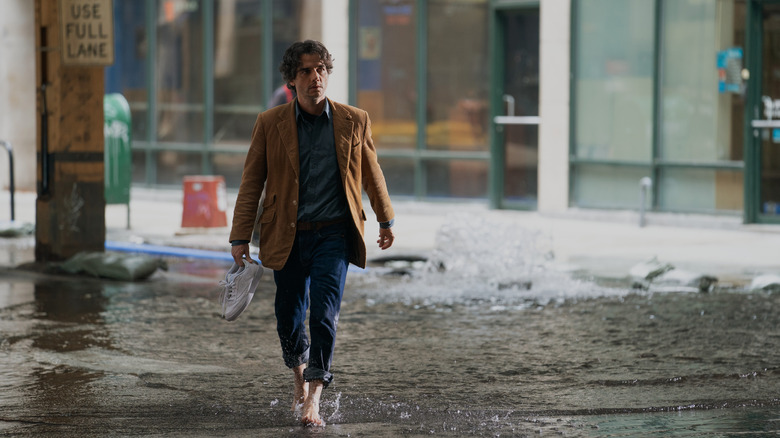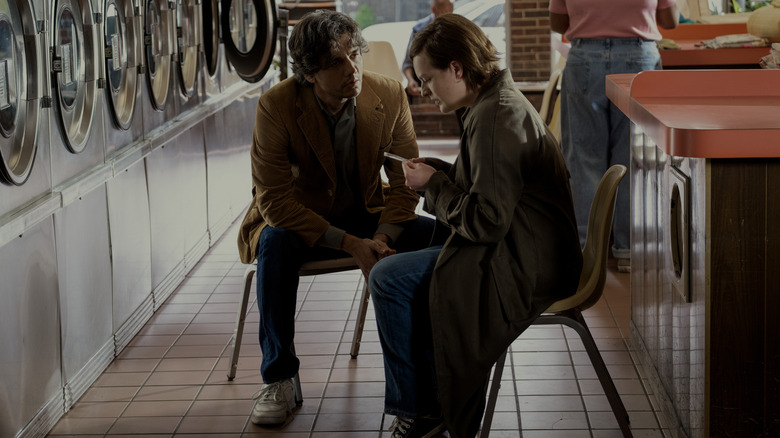Shining Girls Actor Wagner Moura Talks About The Electric Vibe On Set [Interview]
The "troubled journalist" archetype is common enough to make your eyes roll out of your head, but when a role like that is being played by Wagner Moura ("Narcos"), suddenly it's not quite as irritating. Moura has a magnetic quality as a performer, so even when he's playing a disheveled, drunken, past-his-prime reporter who's barely keeping his life together, he's able to breathe life into tired tropes and keep viewers interested and engaged. That's what he does in "Shining Girls," the new Apple TV+ mystery show in which he plays Dan Valasquez, a Chicago Sun-Times reporter who teams up with a women named Kirby (Elisabeth Moss) to track a serial killer who has crossed paths with Kirby before.
I caught up with Moura at a recent press junket and spoke to him about playing a journalist, whether he and Elisabeth Moss approach scenes the same way, working with Alex Garland on A24's upcoming movie "Civil War," and more.
"He's a good journalist, so I was happy about that"
Whenever I speak with people who are making projects that center on journalism, it's only a matter of time until "All the President's Men" comes up, since that's the gold standard for the genre. But in my eyes, your character in "Shining Girls" is actually a much different type of guy than the characters that Robert Redford and Dustin Hoffman play in that movie. So I'm curious if you had any conversations about that with [showrunner] Silka [Luisa] in your early talks about this part.
A little bit. First of all, one of the things that I was most proud of about the show was the fact that I was going to play a journalist, because this is my background. I graduated at as a journalist. I worked as a journalist for a while. So I was basically coming back to all the — I was reading about journalism again. Most of my friends in Brazil are journalists, so I was talking to them especially about the difference between being a journalist nowadays and what was it to be a journalist back in the '90s, which is completely different. Nowadays, again, I think this is a very good moment to be playing a good journalist, because I think that journalism is in such a difficult spot right now with the spread of fake news, people getting information through social media, and especially because world leaders nowadays are openly discrediting the work of journalists. I think that's a horrible thing to do, especially because it's basically putting journalists in a dangerous spot: Journalists are getting killed everywhere, just because they're doing their job. So I was proud of playing a good journalist. Dan is a very troubled guy, complicated guy, but he's a good journalist, so I was happy about that.
"My favorite thing in the show is the relationship between Kirby and Dan"
I think it is fair to say that your character has a drinking problem in this show. How did you approach that aspect when it came to developing this character?
Well, first of all, I think that was great to have. It adds a lot of layers to the character. In the beginning of the show, we meet Dan, we see that he's troubled, that he's coming from a leave of absence. We don't quite know why. But from episode 3 on, we start to know more about him: That he's raising his kid by himself, that he has this issue with alcohol — which is not a very uncommon situation for journalists, especially back then in the day, when you were working nonstop. It was a very common thing.
My favorite thing in the show is the relationship between Kirby and Dan, because I think that they're both very troubled characters and they recognize in each other similar wounds and they're both characters that are trying to get their lives back on track. In the beginning, for Dan, it's more like a professional thing. He wants to crack that story in order to become the journalist that he used to be. He was a guy who had his own column. But after he meets Kirby, things become more personal. It's very important for him to help that woman to have her voice back, to get her life back on track. And by doing that, his life goes back on track again. So I think it's very well written, and I love the way that they approach each other in a very slow [way]. They don't open up to the other immediately, but slow. They start to see each other as people with similar issues, and it's a beautiful relationship.
Sometimes actors work well together because they have similar methods of working, and other times they work well together despite having drastically different ways of approaching the job. What was the dynamic between you and Elisabeth Moss, on an acting level?
It was perfect, because I think we have very similar ways to approach a scene, which is basically not knowing exactly what's going to happen. It's not that you read the scene and you're like, "Oh, this is what's going to happen. This is how I should behave." Let's see what happens! She is exactly that kind of actress. And as a director, too, when she directed the episodes, it was great because she let me free to explore. The best thing for an actor is to feel that the director is not judging you, that the director doesn't want you to nail it, but "No, let's explore it." So some scenes, we started by doing it in a [certain] way, and then it just shifted to a different place, which I love. Lizzie is exactly that kind of actor.
"Each scene was a surprise"
Despite whatever problems Dan might have, he is a guy who is always searching for the truth. Did you have any conversations with Silka about how a character like Dan would ever believe the wild series of events that actually plays out here and coming to grips with that over the course of this season?
It's beautiful, because how can you believe those things? It's exactly why I think the personal part of it becomes more important at some point, because he sees that there is something there in that woman that feels right in what she's saying. Although everything that she's saying seems crazy, at the same time, there is something there that he recognizes in himself that connects him with what she's saying. That's beautiful, because in a way it's anti-journalism. How can you believe that thing? How can you verify those things? It's impossible. But he keeps trusting her, and I think that's beautiful.
I'm also a huge fan of Alex Garland's work. And I think that you're supposed to be working with him on a project called "Civil War." What can you tell me about that?
We are working [on it] right now. We've been shooting for a month already, and it's been great. I can't tell you a lot about the film yet, but I'm a fan of Garland and I'm excited to be working with Kirsten Dunst, the great Stephen Henderson, who is an actor that I have a lot of admiration for. And this young, amazing actress called Cailee Spaeny. So it's the four of us in a car, trying to figure this Civil War out.
Thinking back on your experience making "Shining Girls," what was the most surprising thing that happened on the set? You talked about there being room for finding things on the day. Was there anything that particularly surprised you while making the show?
Each scene was a surprise. When you approach the scenes, especially in my scenes with Lizzie, I love when you can read the scene in different ways. And it's beautiful when you figure that out while you're doing it. It's very exciting. It's the biggest excitement, I think, of this job, to play with your partner and when she gives you something, and you go, "Oh!" So we go into a different direction. Nothing is previously agreed. That's the best, because it generates an electricity in a set and in a scene. That's what you want.
The first three episodes of "Shining Girls" are streaming now on Apple TV+.



